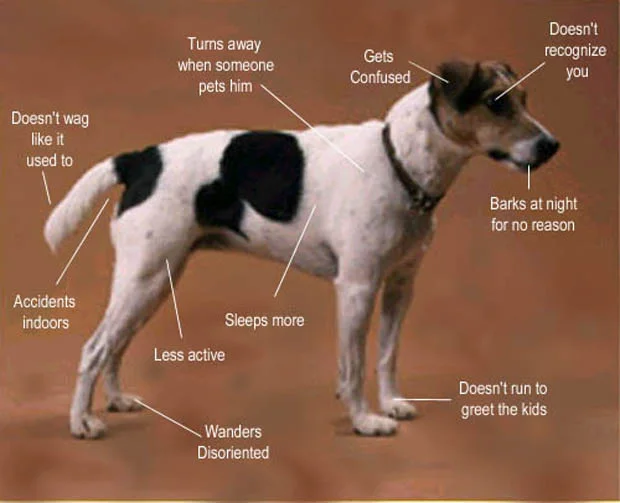Dog dementia: Do dogs have dementia? We are right. Although many veterinarians and dog owners are unaware of it, canine cognitive impairment, or CCD (also known as cognitive dysfunction syndrome), affects a significant portion of the senior dog population.
Table of Contents
Advances in veterinary medicine and improved owner care that can help dogs live longer have also increased the incidence of CCD, although 85 percent of cases remain un diagnosed.
What is dementia in dogs?
We have all recognized that our pets slow down with age and we agree that this is a normal part of the aging process, but the syndrome of cognitive dysfunction should not be neglected, with some appropriate intervention, your pet will begin to enjoy a better quality of life again.
Inevitably cognitive dysfunction is an inappropriate loss of mental function that is not associated with other medical conditions.

It is similar to dementia in humans and can lead to loss of awareness, awareness and interaction, environment, memory and learning problems and decision making.
Canine Dog dementia treatment
If you are concerned that your dog will be affected, the first port of call should be with your vet. It is important to rule out other medical conditions that may affect mental function before diagnosing cognitive dysfunction.
A complete physical examination is required along with a detailed history of when and what symptoms you noticed.
Also Read: Best Online Dog Training Courses for 2021 during Covid Pandemic
Your vet may suggest that you perform some routine blood and urine tests to rule out conditions such as diabetes, liver and kidney disease, and underactive thyroid (hypothyroidism).
If behavioral problems are significant, consultation with a behavioral specialist is required.
Diagnosis of dog dementia
There are many different approaches to treatment when cognitive dysfunction is diagnosed and in general, the combination is most effective.
First, your vet may prescribe medical treatment to improve mental functioning and restore some energy.
In addition, a change in diet may be recommended. Since the goal is to limit further damage to neurons in the brain, the diet should contain high levels of antioxidants and some experts suggest adding omega 3 fatty acids.
Supplements are also available to include in the diet to provide these factors.
In addition, your dog may need ongoing behavioral therapy – because dogs with cognitive impairment may find it very difficult to learn or re-learn behaviors.
The betterment of the dog’s surroundings also plays an important role in improving quality of life and stimulating cognitive processes.
Providing new toys, developing relationships with people and other animals, walking in different places and even getting a playmate are all exciting enough to help improve mental performance.
How do you treat dementia in dogs naturally?
While dog dementia is not a progressive condition, you can do a lot to improve your dog’s quality of life. Here are seven easy examples.
It is important to visit a vet if you suspect your dog has CCD or Dog dementia. Medications can relieve symptoms and slow progress.
1. Have patience
Dogs with dementia often show strange behaviors. They may get less response to commands, lose their home training, or have difficulty eating and drinking.
Dogs with CCD are also more likely to bark when anxious.
Through these changes, you need to be more patient with your dog.
If your dog has an indoor risk it can be frustrating, for example, if he didn’t do it on purpose – and scolding him can cause extra stress and anxiety.
2. Make sure your pet can always find his food, water, and bed
A dog suffering from dog dementia is more likely to be confused, especially if he is struggling with vision loss.
To make things easier for your pet, always keep water, food, and bed in one place. Try not to place new items or furniture near his bed or water, as this can cause anxiety.
On the relevant note, make sure your dog bed is comfortable and helpful.
Orthopedic dog beds are often the best choice for senior dogs because they prevent pressure points that can exacerbate arthritis.
If you do not know what to buy, Dog Clinic has a list of the best orthopedic beds.
3. Exercise is still important
Exercise is linked to brain health and mental well-being, so walks are important for dogs with dementia.
Moderate exercise gets blood flow, which brings more oxygen to the brain. New smells and scenes are also brilliant for mental stimulation.

Gentle walks are best for older dogs with dementia. Rough walking can be too much for your pet and may not provide the same brain benefits.
Give him a good amount of time to sniff and walk at his territory.
4. Brain training is also required
Mentally stimulating games keep the brain active and slow the progression of dementia. Some examples of games to play:
Use of Brain Training in Dogs to promote natural behaviors
Pet Teaching or strengthening the basic tricks your pet already knows
Giving food or treats through simple puzzle toys

A Hiding treats around the room and allowing your dog to find them
It is better to keep these games short and straight. You do not want your dog to get tired or bored.
If you notice stress signals, end the game with a positive note and try a different activity next time.
5. Keep a consistent routine
Most dogs enjoy routine schedules, but a systematic balanced schedule is even more important for those with dementia.
Common symptoms of CCD include dizziness and anxiety.
Lack of routine can make these worse, because the dog does not know when to play, feed, exercise or rest.
To help your pet, try to be consistent when your dog wakes up, goes to bed, walks and is fed. It’s not always easy, but it can help reduce anxiety.
A consistent sleep schedule will make your dog less likely to get confused during the night.
6. Make sure your dog is easy to spot
Dogs with dementia are often in a state of disorientation or confusion. During these episodes, it is common for them to wander in the yard or go for a walk.
For these reasons, a demented dog should never be left unattended. This is especially important in yards that are not completely safe, new places or not within walking distance.
Always make sure your dog is microchipped with up-to-date information and is wearing a collar with his name and contact number.
7. Adjust care according to your dog’s characteristics
Canine dementia is a progressive condition. It is impossible to predict how it will affect each dog, but the symptoms are likely to change over time.
Regardless of how your dog’s condition affects his behavior, you will have a close bond with your pet.
Make sure everyone in the house is aware of these changes and is ready to adjust how they deal with the dog so he feels safe and lovable.
Keep in mind that older dogs suffer from additional health problems. These include diabetes, vision loss and kidney disease.
It is important to discuss any new symptoms with your vet so he or she can provide an accurate diagnosis.
How long can a dog live with dementia?
On average, a dog can live for around two years after an official diagnosis.
The lifespan of a dog with dementia, also known as canine cognitive dysfunction (CCD), can vary depending on several factors. CCD is a progressive neurological condition that affects older dogs, similar to Alzheimer’s disease in humans. While there is no cure for Dog Dementia, there are treatments and strategies to manage the condition and improve the quality of life for affected dogs.
- Age: The age at which a dog develops dementia plays a significant role in determining their lifespan with the condition. Typically, CCD is more common in senior dogs, generally around 10 years of age and older. Dogs diagnosed at an earlier age may experience a longer duration of the disease, while those diagnosed later in life may have a shorter time affected by it.
- Breed: Some dog breeds are more prone to developing Dog Dementia than others. Breeds such as Miniature Poodles, Cocker Spaniels, and Boxers are among those at higher risk. The severity and progression of CCD can vary among breeds, which may impact how long a dog can live with the condition.
- Severity of the Disease: The severity of CCD can vary from mild to severe. Dogs with mild cases may experience slower progression and can live a relatively normal life with appropriate management and treatment. Conversely, dogs with severe Dog Dementia may deteriorate more rapidly, impacting their overall lifespan.
- Early Diagnosis and Treatment: Early diagnosis and proactive management can significantly improve a dog’s quality of life and potentially extend their lifespan with Dog Dementia. Veterinarians can prescribe medications and recommend lifestyle changes, including dietary adjustments, environmental enrichment, and mental stimulation, to slow the progression of the disease.
- Overall Health: A dog’s general health and any concurrent medical conditions can also influence their longevity with dementia. Dogs in good overall health may be better equipped to cope with the challenges of CCD and live longer with the condition.
It is important to note that there is no specific timeframe for how long a dog can live with dementia, as individual cases can vary widely. Some dogs with mild Dog Dementia can live for several years with appropriate care, while others with more severe cases may have a shorter lifespan. Regular veterinary check-ups and ongoing communication with your veterinarian are crucial for monitoring your dog’s condition and making necessary adjustments to their treatment plan as needed.
If you suspect that your dog is showing signs of CCD, such as disorientation, changes in behavior, or loss of housetraining, it is essential to seek a veterinarian’s evaluation and guidance to provide the best possible care and support for your furry friend.
Is a dog with dementia suffering?
The question of whether a dog with dementia is suffering is a complex and sensitive one. While dogs with canine cognitive dysfunction (CCD) may exhibit unusual behaviors and experience cognitive decline, it’s important to approach this topic with empathy and understanding.
Firstly, it’s crucial to recognize that dogs with Dog Dementia or CCD are not suffering in the same way humans might suffer from conditions like Alzheimer’s disease. Dogs do not have the same level of self-awareness or the capacity to comprehend their condition as humans do. Therefore, they may not experience suffering in the same emotional or psychological sense that we do.
However, dogs with Dog Dementia can experience distress, confusion, and anxiety due to the changes in their cognitive function. They may become disoriented, forget familiar people or places, and display restlessness or agitation. It’s important to interpret these behaviors as signs of their cognitive impairment rather than emotional suffering.
As responsible pet owners, our role is to provide the best possible care and support for our dogs with CCD. This includes:
- Patience and Understanding: As mentioned in the prompt, patience is crucial. Understanding that your dog is not intentionally misbehaving but is struggling due to cognitive changes can help you approach their behavior with empathy.
- Veterinary Care: Consult with a veterinarian for an accurate diagnosis and guidance on managing CCD. Medications and treatment plans can help alleviate some of the symptoms and improve your dog’s quality of life.
- Adaptations: Make necessary adaptations to your dog’s environment and routine. This may involve providing clearer cues, creating a safe and comfortable space, or adjusting their diet to suit their changing needs.
- Emotional Support: Offer your dog emotional support through affection, reassurance, and a consistent routine. Spending quality time with them can reduce their anxiety and provide comfort.
- Quality of Life: Continuously assess your dog’s quality of life. If their condition reaches a point where they are in distress and their overall well-being is compromised, consult with your veterinarian to discuss the best course of action, which may include humane euthanasia to prevent unnecessary suffering.
In summary, while it’s challenging to determine if dogs with Dog Dementia or CCD are suffering in the same way humans do, it is our responsibility as pet owners to ensure their well-being and provide them with the best possible care. Approaching their condition with patience, understanding, and empathy is key to improving their quality of life during this challenging time.

